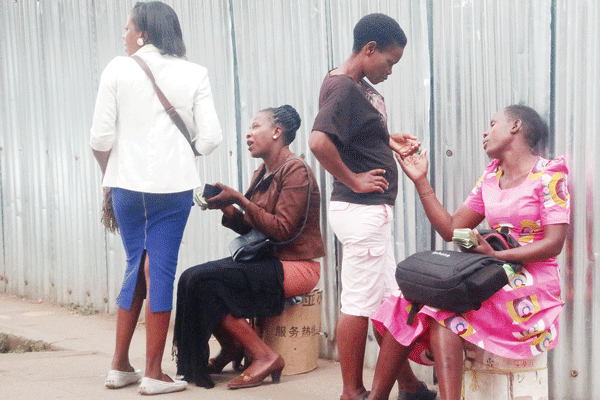
WE conclude the discussion regarding cash-related offences with a very topical issue.
Rights: MIRIAM TOSE MAJOME

Selling of United States bank notes on the informal market for a premium has resurfaced in a big way, given the critical shortage of bank notes in the formal structures.
This happened in 2008 when the same problem surfaced.
We address some of the questions surrounding the legalities of buying and selling bank notes informally.
What is happening cannot be ignored or swept under the carpet or wished away.
For the majority of ordinary people, buying cash from alternative sources is the only way of getting it when it is needed.
No meaningful cash can be withdrawn from bank accounts, at least by ordinary folk.
- Chamisa under fire over US$120K donation
- Mavhunga puts DeMbare into Chibuku quarterfinals
- Pension funds bet on Cabora Bassa oilfields
- Councils defy govt fire tender directive
Keep Reading
The process of applying for meaningful amounts of cash from banks is cumbersome and success is not guaranteed.
Without alternative sources of cash, people are left with no option but to buy it, thus, only in Zimbabwe can US dollars be found trading against themselves.
Informal enquiries reveal that the premium is between 10% to 18% of the required amount.
This means $100 cash costs between $110 and $118 and it is paid via bank transfer.
It must be stated that selling cash without authorisation is illegal and is an offence in terms of the Bank Use Promotion and Suppression of Money Laundering Act Chapter 24:24.
‘Burning’ cash
The year 2016 saw the unauthorised buying and selling of cash for a premium resurfacing in a big way.
The practice was rampant in 2008 when cash shortages were also rife and “burning money” was the buzzword in town.
Retailers and wholesalers, commuter omnibus operators, fuel stations and individuals are believed to be the main culprits behind hoarding of US bank notes for resale.
This is what the Bank Use Promotion and Suppression of Money Laundering Act Chapter 24:24 and the policy announced by the Reserve Bank seek to quell and suppress.
Seizing cash
Cash-detainable offences are listed in the Act and they refer to any one of the listed offences in respect of which cash may be seized from a person in anticipation of prosecuting that person for the offence.
Cash-detainable offences are such as traders, parastatals and other commercial entities failing to open bank accounts and traders and commercial entities failing to deposit surplus cash.
Settling debts above $5 million in cash and failing to maintain trading records as required and failing to furnish proof of cash deposits.
The cash will be confiscated and used as evidence in the ensuing criminal trial.
There is no reason the cash should not be returned to its owner after the criminal case is finished.
The seizure of a Mutare businessman’s $1,5 million cash in 2012 by the police led to a revolutionary judgment in March, which struck down section 5(2) of the State Liabilities Act Chapter 8:14.
The State had formerly relied on that section to escape from complying with court orders, as State property was immune to attachment.
The State ordered that government property could from, thence, be attached to satisfy court judgments.
The State had since 2012 refused to give the businessman, Blessing Mangwiro, back the money that had been seized from him by the police.
That landmark ruling, and several others before, made it clear that the State had no right to permanently withhold seized cash.
The concept of private cash and the rights of owners was discussed in the past weeks.
Section 14: Unlawful trading in cash
1. No person other than a financial institution or money lender shall exchange any negotiable instrument for cash at a premium.
2. No financial institution or money lender shall charge any premium for exchanging any negotiable instrument for cash in excess of the greater of the following amounts:
a) the amount of any fee commission or other charge (exclusive of any tax imposed by the State) imposed by it for such exchange on the fixed or
b) the prescribed amount.
Negotiable instrument means any bill of exchange, letter of credit, cheque draft or other document, whether negotiated or not, which has been drawn or issued either inside or outside Zimbabwe and is intended to enable any person to obtain either directly or indirectly any sum of money whether in Zimbabwean or foreign currency.
Only cash dealers and recognised and registered financial institutions are allowed to deal in the exchange of cash for a fee.
A cash dealer is someone carrying on the business of an insurer, an insurer, an insurance, intermediary, a securities dealer or stockbroker, a futures broker or an operator of a gaming house, casino or lottery.
Cash dealers also refers to those involved in selling or redeeming travellers’ cheques, money orders or similar instruments and dealing in bullion or collecting, holding and delivering cash as part of a business that provides payroll services.
Cash dealing includes money changing such as exchanging currency, money, cheques, travellers’ cheques or other negotiable instruments.
The law addresses only authorised cash dealers such as those mentioned and precludes anyone not mentioned or recognised as a cash dealer from selling cash.
Miriam Tose Majome is a lawyer and a teacher. She can be contacted on [email protected]











